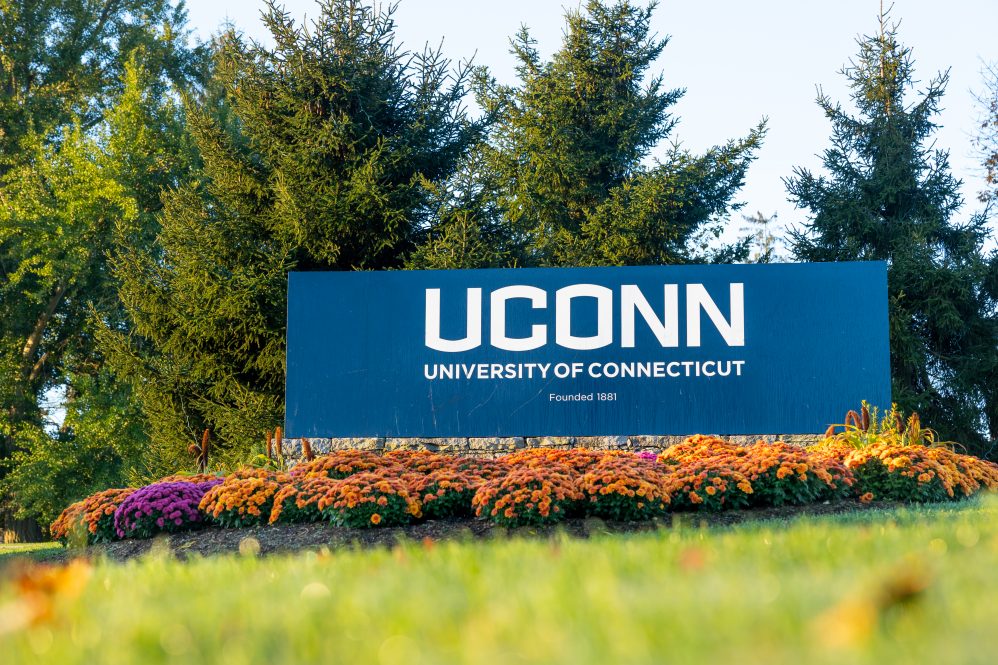A prominent rating agency has upgraded its assessment of state bonds used in the transformational UConn 2000 initiative, helping to reduce long-term borrowing costs while reflecting UConn’s strong reputation and Connecticut’s commitment to higher education.
UConn President Radenka Maric joined Gov. Ned Lamont and State Treasurer Erick Russell on Thursday in announcing the upgrades by Fitch Ratings, which were issued on the state’s UConn General Obligation (GO) bonds.
Their rating moved up from “A+” to “AA-” as part of Fitch’s positive assessment of creditworthiness and stability.
The rating boost comes at an opportune time: In early November, the Treasurer’s Office and UConn will offer about $227 million of bonds for sale to fund projects at the University that include the South Campus residence hall under construction, its related infrastructure, the new Science 1 building, Gant Science Complex renovations, and others.
Another $129.3 million of existing UConn bonds are also expected to be refunded at lower interest rates to generate savings.
Entities such as Fitch assign ratings to bonds to help investors assess risk as they consider which bonds to purchase. The borrowers repay the bond debts over a set period of time.
Stronger bond ratings help entities like UConn and the State of Connecticut save money, earning them lower interest rates on bonds they sell to fund long-term capital projects such as construction of new buildings or other large-scale initiatives.
In turn, that frees up revenue to dedicate to other initiatives to benefit the state and its residents, including UConn students.
“UConn is pleased with Fitch’s recognition of the strong partnership between UConn and the State, embodied in the UConn 2000 program,” President Maric says.
“The State has provided unwavering commitment to the UConn 2000 program for over 27 years and counting, helping to push demand higher than ever for a UConn education. This Fitch upgrade will reduce UConn 2000 borrowing costs and support continued investment in UConn and the state’s economy.”
It’s the second time in the last 12 months that UConn-related bonds have been upgraded, showing continued confidence in the financial management and attractiveness of the University and the State of Connecticut.
In fall 2022, Moody’s Investors Service upgraded its ratings on other UConn-related bonds, citing the University’s strong fiscal management, institutional reputation, conscientious financial practices during the COVID pandemic, and continued attractiveness to potential students.
In Fitch’s announcement this week about its upgrades, it cited the success and impact of recent state budgetary reforms and Connecticut’s commitment to its higher education system, saying in part: “Strong legal protections (on the bonds) are buttressed by the constitutional state priority of higher education and the expectation of continued strong support of the UConn system.”
“This credit rating increase is proof that the state’s fiscal guardrails, including spending cap, bond covenants, and a focus on paying down our long-term liabilities, is saving taxpayer dollars,” Gov. Lamont says.
“This is the third credit rating upgrade this year Connecticut has experienced, and it is a recognition by investors that we are on the right financial path,” he adds. “Strategic investments in the state’s flagship university benefit our business community to ensure they have a top-flight workforce, building a brighter future for all of Connecticut.”
The UConn 2000 program – including its second- and third-generation versions, 21st Century UConn and Next Generation Connecticut – and the complementary Bioscience Connecticut initiative were all approved by the Connecticut General Assembly at various times in the past few decades.
They have transformed the University over the past several decades through major initiatives to modernize or replace academic facilities, research space, and support other offerings at Storrs, UConn Health, and the regional campuses.
“The UConn 2000 bond program has been transformative for our state’s flagship university, earning UConn a place among the elite public universities and generating economic opportunity across Connecticut,” Treasurer Russell says.
“This credit upgrade will allow similar investments to continue, while lowering costs for taxpayers. It’s in our collective best interest to support UConn’s continued success and to maintain state government’s commitment to sustained fiscal discipline,” he adds. “This is a great example of how that work can overlap, benefitting our long-term economic health while making necessary investments in our state.”



